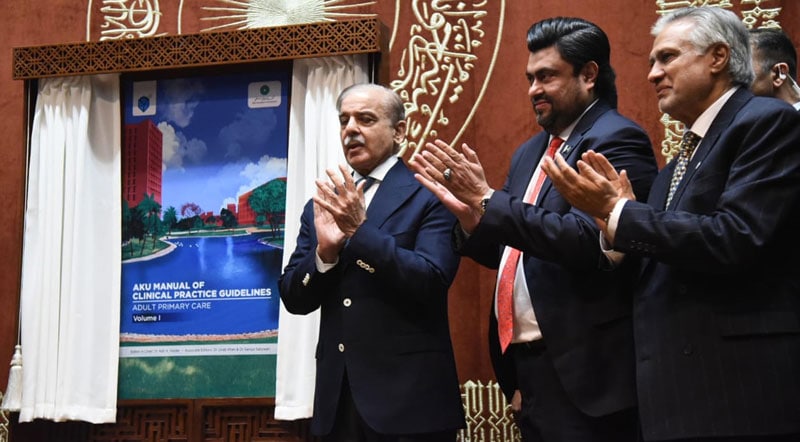PM launches new healthcare guidelines at AKU

MG News | January 09, 2025 at 12:06 PM GMT+05:00
January 09, 2025 (MLN): Aga Khan University (AKU) launched the AKU Manual of Clinical Practice Guidelines, a valuable resource for hospitals and healthcare facilities aimed at providing people with high-quality, evidence-based care.
Prime Minister Shehbaz Sharif said while addressing the launch ceremony of the manual at the AKU Auditorium.
This initiative aligns with the vision of the Government of Pakistan, ensuring that individuals receive the healthcare they deserve, he added.
The government is committed to providing optimal healthcare, which is essential for a thriving society and a mark of clinical excellence and ethics.
"It was an honor and privilege to be here at the Aga Khan University, a beacon of knowledge and innovation with its unwavering commitment to excellence in medical education, research, and patient care", he stated.
The launch of the AKU Manual of Clinical Practice Guidelines was a landmark achievement that reflected this institution’s resolve to elevate standards of healthcare, he added.
Prime Minister Shehbaz also commended the legacy of the Aga Khan family towards supporting initiatives for the social and economic uplift of our country.
He expressed optimism that the University would continue to work closely with government institutions and professional organizations.
This collaboration would ensure that such practice guidelines were widely distributed and readily accessible.
The Prime Minister said the country’s healthcare system was unfortunately riddled with many hurdles and challenges, such as limited access to quality care in rural areas and shortages of skilled professionals.
He also highlighted the dual burden of communicable and non-communicable diseases as a significant issue facing the healthcare system.
Quality healthcare for all Pakistanis had always been a critical priority for him, as reflected in Punjab’s exemplary track record during his tenure as Chief Minister.
He emphasized the establishment of world-class tertiary care hospitals like Sheikh Zayed Hospital.
Additionally, significant strides were made by equipping every district with advanced diagnostic tools, including MRI machines.
He said Pakistan Kidney and Liver Institute and Research Center (PKLI) had also been launched to provide advanced care and promote prevention.
The center aims to offer top-tier education and foster research to bridge science and clinical practice for all, irrespective of specific distinctions.
He said PKLI was the first public sector hospital in South Asia to achieve the highest accreditation in healthcare awarded by Joint Commission International (JCI).
More than 1200 kidney and liver transplants have been performed successfully to date, with 75% of the patients receiving free or subsidized treatment, he added.
He said "Institutions of global standards and international prestige, like AKU and PKLI, give us hope, bridging the gap between the many challenges we face and the solutions we need."
"These institutions empower our healthcare system to evolve and respond to the needs of every citizen", he added.
“In today’s rapidly advancing world, the integration of modern technology, artificial intelligence, and telemedicine into healthcare is no longer a luxury, it is a necessity", PM Shehbaz said.
“By embedding the best practices outlined in this manual into these advancements, we can revolutionize patient care,” he added.
“This will expand access to remote regions and enhance outcomes for millions of Pakistanis", he further noted.
The Prime Minister said he firmly believed that partnerships and collaborations between visionary institutions like AKU and the public sector were pivotal.
He emphasized that such collaborations were key to transforming the healthcare landscape of Pakistan.
This manual reflects years of rigorous research and dedication to addressing Pakistan’s lack of standardized clinical practice guidelines.
Using the Grade-Adolopment methodology, it integrates global best practices with local expertise to ensure relevance.
The initiative seeks to improve patient outcomes, reduce the burden on the tertiary care system, and strengthen the country’s healthcare infrastructure.
Copyright Mettis Link News
Related News
| Name | Price/Vol | %Chg/NChg |
|---|---|---|
| KSE100 | 135,939.87 307.74M |
-0.41% -562.67 |
| ALLSHR | 84,600.38 877.08M |
-0.56% -479.52 |
| KSE30 | 41,373.68 101.15M |
-0.43% -178.94 |
| KMI30 | 191,069.98 82.45M |
-1.17% -2260.79 |
| KMIALLSHR | 55,738.07 422.01M |
-1.03% -577.24 |
| BKTi | 38,489.75 45.79M |
-0.02% -8.33 |
| OGTi | 27,788.15 6.87M |
-1.24% -350.24 |
| Symbol | Bid/Ask | High/Low |
|---|
| Name | Last | High/Low | Chg/%Chg |
|---|---|---|---|
| BITCOIN FUTURES | 116,835.00 | 120,695.00 116,090.00 |
-3400.00 -2.83% |
| BRENT CRUDE | 68.83 | 69.41 68.60 |
-0.38 -0.55% |
| RICHARDS BAY COAL MONTHLY | 96.50 | 96.50 96.50 |
0.50 0.52% |
| ROTTERDAM COAL MONTHLY | 104.50 | 104.50 104.25 |
-2.05 -1.92% |
| USD RBD PALM OLEIN | 998.50 | 998.50 998.50 |
0.00 0.00% |
| CRUDE OIL - WTI | 66.69 | 67.13 66.22 |
-0.29 -0.43% |
| SUGAR #11 WORLD | 16.56 | 16.61 16.25 |
0.26 1.60% |
Chart of the Day
Latest News
Top 5 things to watch in this week
Pakistan Stock Movers
| Name | Last | Chg/%Chg |
|---|
| Name | Last | Chg/%Chg |
|---|



